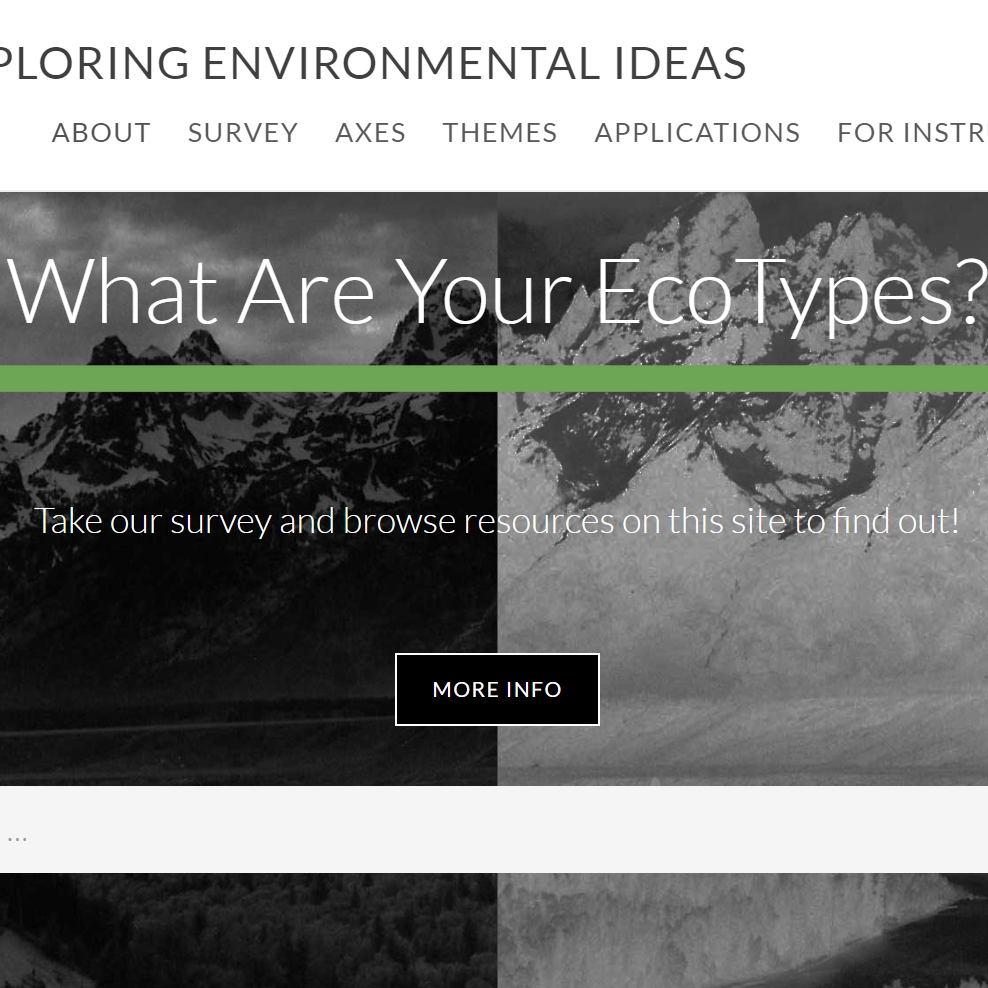
Part of being able to engage with difference and understand other ways of seeing the world is knowing your own lens. In the past few weeks we have been exploring different modes of environmental thought and how we define and understand some of the key terms associated with environmentalism such as nature and environment. We’ve been using EcoTypes themes and questions to guide our conversation, but haven’t been able to analyze our own results so closely. I want to take the chance this week to reflect a little more deeply on my own EcoTypes so that I might have a more solid understanding moving forward.

When asked to picture “nature” this week, my mind went to sitting atop the Headlands looking over the San Francisco Bay (the hills, ocean, skyline, and sounds of the city) or looking out over Portland (a city covered in trees with a river right through the middle and a mountain overlooking from a distance). Coming from such a beautiful city and living in one now, I’ve grown up believing that there is a way for the human and the non-human to coexist beautifully.
So why am I on the pure and wild sides of nature and aesthetics? As I think more and more about defining nature, I realize that I do like the word nature, no matter how constructed it is. I grew up camping, hiking, and birdwatching with my parents, and “nature” has always been a place of healing for me. Nature has a way of working that I just don’t think we can replace. I like being able to communicate that magic, and a lot of my spirituality is cultivated through my connection with these kinds of environments.
When it comes to the ethics of separating a human agenda from a “nature” agenda, I can’t do it. I don’t see one existing without the other. When I think about what an ideal world might look like, it isn’t far from what we have now: areas of pretty wild wilderness that people visit to enjoy and densely populated cities that are also full of greenery. Not one or the other, but both.

I like the way I see myself in this theme. One paradox I appreciate most in my own life is my love for both sacred simplicity and complex, futuristic technologies and innovations. I’m hard on the right of the science and technology axes. Coming from a world tech center and having grown up a Trekkie, I have a real excitement and appreciation for everything futuristic, technological, new, and innovative. I am most optimistic about the ways technology, innovative strategies, and scientific progress can help us to solve the big contemporary challenges of our time, particularly climate change and broader issues of sustainability. I also believe that, while we must learn from the past, our world is not the same place as it was, and we thus need to develop adaptive solutions, rather than trying to undo everything and revert to a prior state.
Yet when it comes to spirituality, I’m surprisingly on the other end of the spectrum. I don’t think that our problems will be solved with technology alone. There is a spiritual connection we have with our planet that is necessary and is beyond the realm of science and technology. If there isn’t then why are we here trying to save the planet? It is an interesting tension though, and I’m left wondering how it manifests in my opinions and whether they can work together. How do other people think about this?

The action theme is all about both for me. I’m a strong believer in “if everyone did it” and I’m working on reducing my carbon footprint in my personal life through going zero-waste, eating local, reducing my energy and material consumption, supporting sustainable and ethical companies, not buying new, etc. Yet, I’m always wondering: how much of this is just about making me feel good? I figure probably a lot. Again, coming from California, and being the daughter of a passionate environmental attorney, I grew up pretty aware of the larger-scale action going on. California is a leading state when it comes to passing regulations that limit emissions, promote green energy, and reduce certain waste products (such as plastic grocery bags). There are many success stories both of top-down approaches and of simple “sustainability” acts, and I don’t think one can succeed without the other. The “coolness” of going green makes individuals aware of issues and the institutional changes keep us all accountable and help us all to succeed.
These two outlier axes are the only ones that I’m not sure are so accurate. Perhaps this is a major point of change since I took the survey a few weeks ago. A number of articles we’ve read have reminded me that environmental justice goes hand in hand with all environmental issues and cannot be set aside just because we in a state of urgency. And, in being exposed to more contemporary modes of environmental thought that aren’t so apocalyptic as I’ve been exposed to before, I’m a bit more optimistic. Being reminded of the transience of life and the incredible adaptability and resilience of both humans and Nature, I’m feeling a bit more empowered about the future.

